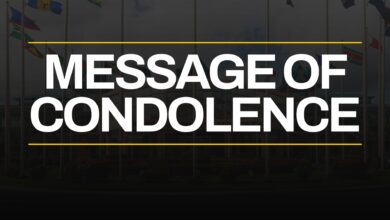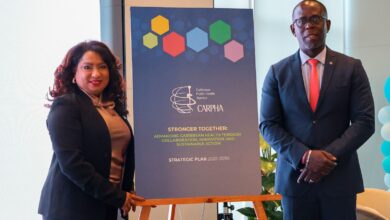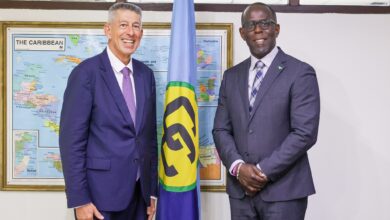(CARICOM Secretariat, Turkeyen, Greater Georgetown, Guyana) The historic Dickenson Bay in Antigua and Barbuda was the venue of the Opening Ceremony of the Twenty-Ninth Meeting of the Conference of Heads of Government of the Caribbean Community.
That after forty-three years, the Conference should return to the venue of the signing of the Agreement which had ushered in the Caribbean Free Trade Area (CARIFTA) in 1968 – the harbinger of the Caribbean Community and Common Market in 1973 and its resultant CARICOM Single Market and Economy – is a fitting prelude to the impending celebrations of the Thirty-fifth Anniversary of the Signing of the Treaty of Chaguaramas, which established the Caribbean Community.
It was against this colourful historic backdrop that CARICOM Heads of Government on 1 July, 2008 took their places on the impressive dais of the Admiral Lord Nelson’s Ballroom of the Sandals Grande Antigua Resort and Spa, and bowed their heads, as the Right Rev Dr Kingsley Lewis invoked God’s presence on the start of what promised to be three days of vigorous debates and dialogue on critical issues which impact the peoples of the Region.
The CARICOM Secretary-General, His Excellency, Edwin Carrington set the pace and tone of the ceremonies by paying tribute to the signatories of CARIFTA, the Hon. Vere Cornwall Bird, then Chief Minister of Antigua and Barbuda; the Hon. Errol Walton Barrow, then Premier of Barbados and the Hon. Linden Forbes Sampson Burnham, then Premier of Guyana.
Secretary-General Carrington, although acknowledging that the process of regional integration had widened systematically both the membership and influence of the Community, pointed to the many social and economic challenges now confronting the Community and noted that the Community’s capacity to respond to the various challenges and to exploit opportunities depended largely on the extent to which the integration arrangements had been deepened and strengthened.
“Most importantly that capacity also depends on how resolute, as a people, is our commitment to the integration process. That depth and strength of commitment is indispensable if we are to overcome what can be formidable challenges from external as well as internal sources,” he added.
The Secretary-General further enumerated some of the achievements of the Community since its establishment, and also pointed to a number of supporting institutions, including the Caribbean Court of Justice (CCJ); the Caribbean Community Climate Change Centre (CCCCC); the Competition Commission and the Regional Negotiating Machinery (CRNM) all of which he stated had been created to deepen the integration process and to empower the Community to respond adequately to the various challenges it faced.
“Much depends on the appropriateness of these regional structures and on the efficacy of their functioning; much also depends on the National Government’s structures in support of the integration process and interacting with the regional structures,”Secretary-General Carrington emphasised.
Three Heads of Government also addressed the ceremony and raised similar issues such as the direction of the Community, food security, regional security, climate change and the implications of the signing of the European Partnership Agreement (EPA).
Jamaica’s Prime Minister, the Hon. Bruce Golding argued that nothing was intrinsically wrong with the Community; it was just that the priorities were confused and that the Community needed to accept the reality of “what it is and what its objectives are.”
He said CARICOM had not failed its leaders; on the contrary, if there were failures it was the leaders who might have failed the Community, and must re-double their efforts to address the failures wherever they were.
Taking the baton from the Prime Minister Golding, President of Guyana, His Excellency Bharrat Jagdeo noted that while dialogue was essential to the Community’s development, it was time for it to stop defining and re-defining the goals of integration and to engage in the pursuit of more innovative and enterprising initiatives that would help to contend with the challenges being faced by the Community.
President Bharrat Jagdeo cited three challenges that he said must be addressed urgently: food security; education and innovation, and climate change and its dire consequences. He then called on CARICOM governments to increase their budgetary allocations to agriculture; review the competitiveness of the regional education sector with a view to converging traditional education with innovations, and devising creative means of safeguarding the Region from catastrophic disasters.
The Guyana President also expressed reluctance in signing the European Partnership Agreement (EPA) with the European Union which would result in liberalized access for goods and services within the markets of the signatory countries and asked for a comprehensive consultation before signing.
Incoming Chairman of CARICOM and Prime Minister of Antigua and Barbuda, the Hon Baldwin Spencer, acknowledged that the Community needed to act as one in the interest of its people, especially in issues of crime and security; high airline charges which he said were impacting tourism-based economies negatively; the bridging of communications gap within the Community and the adoption of a modern and democratic regional governance structure.
He alluded to a recent statement made by Dr the Hon. Ralph Gonsalves, Prime Minister of St Vincent and the Grenadines that CARICOM needed an overhaul and asserted that “we ignore this call at our own peril.”
Chairman Spencer also called on the Community to spearhead the process of revitalisation of the West Indies Cricket, which he contended was seeing ebbing days.
The Opening Ceremony continued with the Sixth Conferment of the Order of the Caribbean Community (OCC) on four outstanding Caribbean men: Jamaica’s Professor the Hon Rex Nettleford, who was cited as Poet, Dancer, Writer, Orator, Critic and the Quintessential Caribbean Man; Dominica’s President, H.E. Dr Nicholson Liverpool who was cited as “a man for all seasons; a man from the people, chosen by the people to serve the people;” the Hon George Lamming, Barbados’ novelist, essayist, activist and a “resolute eloquent prophet against racism;” and West Indies batsman extraordinaire, Trinidad and Tobago’s Brian Lara who was hailed as “the model of excellence of Caribbean Cricketing achievement.”
The Ninth Triennial Award for Women was also presented to Jamaica’s Professor Barbara Bailey who now serves as the Director of the Centre for Gender Studies at the University of the West Indies, Mona Campus. Professor Bailey was cited as an educator and advocate of gender equity and equality.
The winners of the CARICOM 10K Road Race, St Vincent and the Grenadines’ Pamenos Ballentyne and Guyana’s Alika Morgan, as well as the winners of the CARICOM Regional Quiz Competition, St Kitts and Nevis, also received their trophies from the Chairman of CARICOM.
Antigua and Barbuda’s Trevaughan Weston’s calypso-styled musical rendition which called for peace in the human race, provided a fitting climax to what was a meaningful three hours of thought-provoking speeches; presentation of citations and awards at the Opening Ceremony of the Twenty-Ninth Meeting of the Conference of Heads of Government.
That the ceremonies for the first time were chaired by Antigua and Barbuda’s two CARICOM Youth Ambassadors, Cleveroy Thomas and Sachieco Hopkins also attested to the Community’s commitment to engage and involve youth in their own development.





